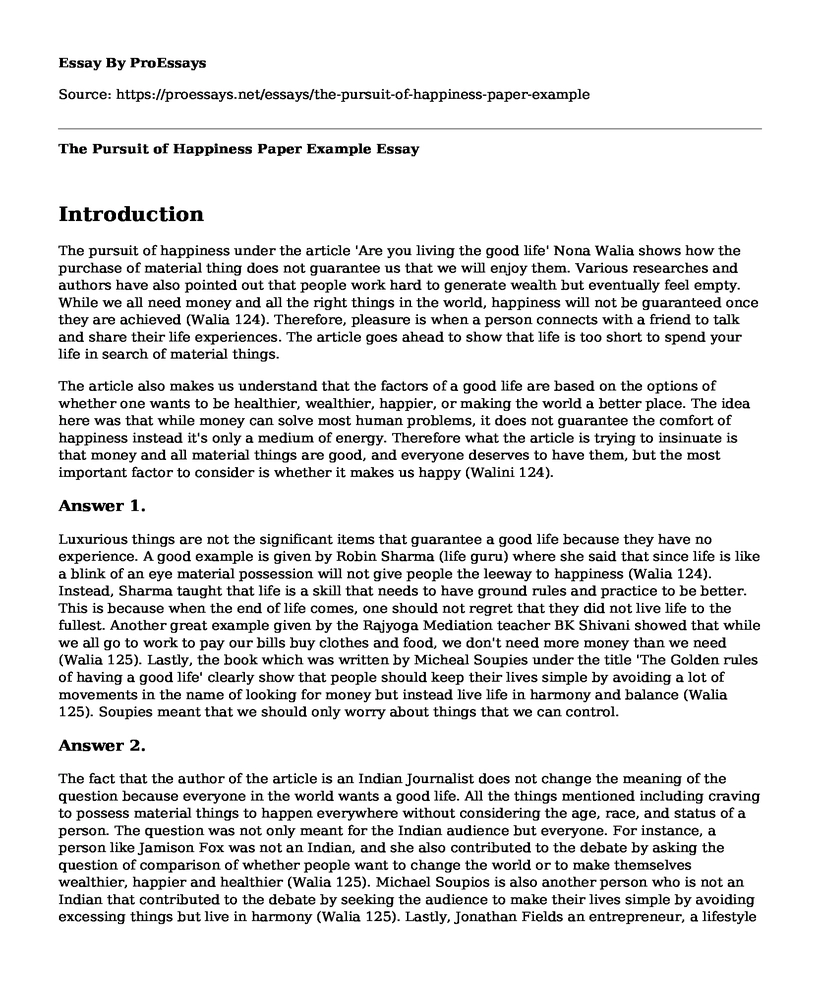Introduction
The pursuit of happiness under the article 'Are you living the good life' Nona Walia shows how the purchase of material thing does not guarantee us that we will enjoy them. Various researches and authors have also pointed out that people work hard to generate wealth but eventually feel empty. While we all need money and all the right things in the world, happiness will not be guaranteed once they are achieved (Walia 124). Therefore, pleasure is when a person connects with a friend to talk and share their life experiences. The article goes ahead to show that life is too short to spend your life in search of material things.
The article also makes us understand that the factors of a good life are based on the options of whether one wants to be healthier, wealthier, happier, or making the world a better place. The idea here was that while money can solve most human problems, it does not guarantee the comfort of happiness instead it's only a medium of energy. Therefore what the article is trying to insinuate is that money and all material things are good, and everyone deserves to have them, but the most important factor to consider is whether it makes us happy (Walini 124).
Answer 1.
Luxurious things are not the significant items that guarantee a good life because they have no experience. A good example is given by Robin Sharma (life guru) where she said that since life is like a blink of an eye material possession will not give people the leeway to happiness (Walia 124). Instead, Sharma taught that life is a skill that needs to have ground rules and practice to be better. This is because when the end of life comes, one should not regret that they did not live life to the fullest. Another great example given by the Rajyoga Mediation teacher BK Shivani showed that while we all go to work to pay our bills buy clothes and food, we don't need more money than we need (Walia 125). Lastly, the book which was written by Micheal Soupies under the title 'The Golden rules of having a good life' clearly show that people should keep their lives simple by avoiding a lot of movements in the name of looking for money but instead live life in harmony and balance (Walia 125). Soupies meant that we should only worry about things that we can control.
Answer 2.
The fact that the author of the article is an Indian Journalist does not change the meaning of the question because everyone in the world wants a good life. All the things mentioned including craving to possess material things to happen everywhere without considering the age, race, and status of a person. The question was not only meant for the Indian audience but everyone. For instance, a person like Jamison Fox was not an Indian, and she also contributed to the debate by asking the question of comparison of whether people want to change the world or to make themselves wealthier, happier and healthier (Walia 125). Michael Soupios is also another person who is not an Indian that contributed to the debate by seeking the audience to make their lives simple by avoiding excessing things but live in harmony (Walia 125). Lastly, Jonathan Fields an entrepreneur, a lifestyle innovator and an author that lives in New York also proves why the question that came from an India Author does not change its meaning.
Works Cited
Walia, Nona. "Are You Living the Good Life.'?" Living the Good Life, pp. 124-125. doi:10.2307/j.ctt3fgnzq.5.
Cite this page
The Pursuit of Happiness Paper Example. (2022, Aug 23). Retrieved from https://proessays.net/essays/the-pursuit-of-happiness-paper-example
If you are the original author of this essay and no longer wish to have it published on the ProEssays website, please click below to request its removal:
- Chronic Back Pain, PTSD and MDD Treatment Plan Paper Example
- Essay Sample on Psychiatric Mental Health Nursing
- Essay Example on Aging: Universal Phenomenon Impacting Health and Mortality
- Early Traumatic Experiences & Parental Reflective Functioning - Essay Sample
- Essay Example on Adolescents Need Supportive Environments for Positive Development
- Essay Example on Freud's Impact: Shaping Psychology of Today
- Free Essay Sample on Technology Into Our Daily Lives







